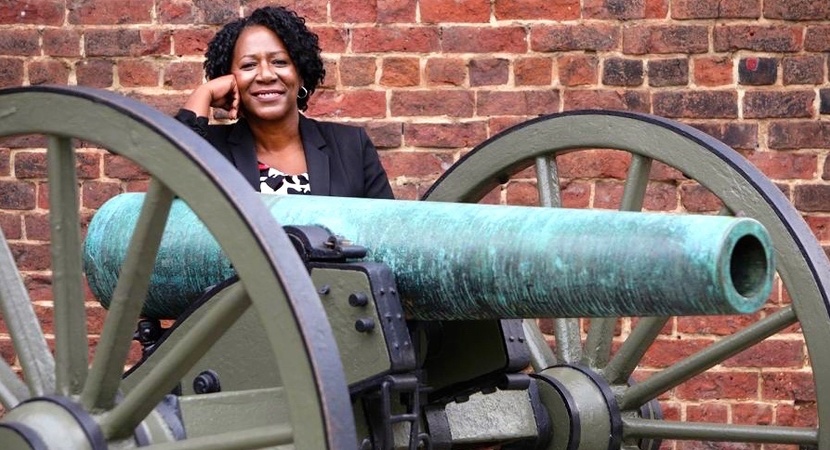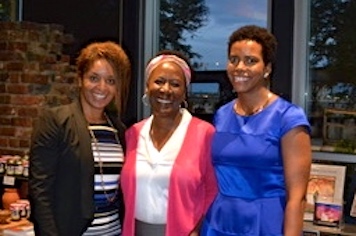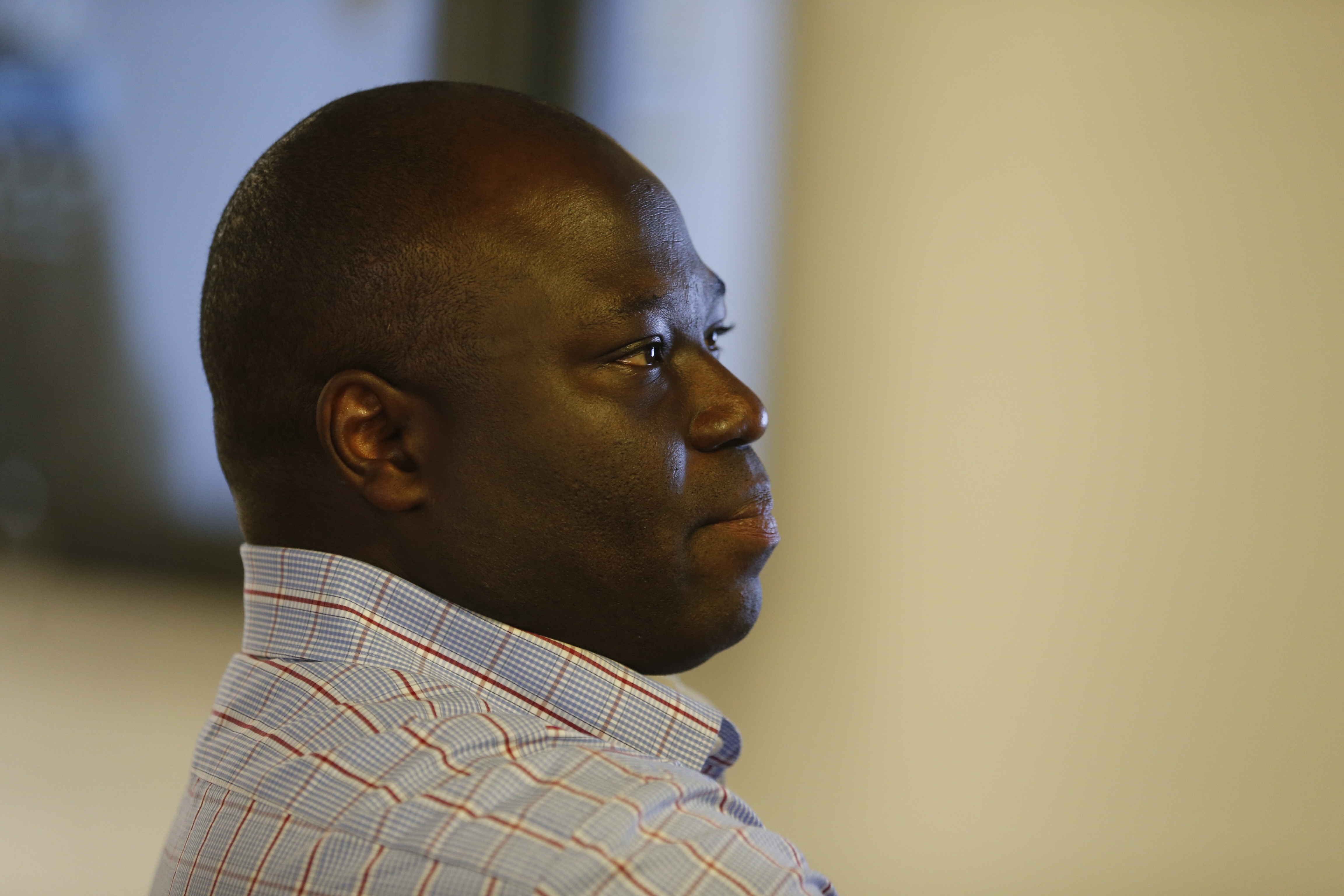
Christy Coleman, director of the American Civil War Museum, talked to the Fellows Alumni and other LCLD stakeholders at a special networking event in downtown Richmond, VA. (Photo courtesy of The Washington Post)
Finding new perspectives on the Civil War may seem impossible, given that the war, which ended more than 150 years ago, is one of the most studied, and written about, chapters in American history. Yet for Christy Coleman (below, center), director of the American Civil War Museum in Richmond, VA, the war illustrates the ongoing power of a narrative to change and yield new insights, depending on who's telling the story.
In welcoming the LCLD Fellows Alumni to her museum on September 18, Coleman urged them to see the story of the Civil War from a diversity of perspectives—from the viewpoint of the Confederacy, from the viewpoint of the Union, and from the often overlooked viewpoint of enslaved and free African Americans.
"History has power to help people move forward," she said—but only if they make an effort to see it from new vantage points. She calls this process "navigating narrative change," and regards it as a vital part of America's unfinished business related to the Civil War.
That was a message that organizers of the event—Fellows Alumni Rudene Haynes (below, right), a partner with Hunton Andrews Kurth, and Valyncia Saunders (below, left), assistant general counsel with Altria—believed would resonate with the Richmond-area LCLD Fellows, Pathfinders, Members, and other diversity leaders in the legal community who attended.

The Civil War museum is a treasure trove, said Coleman, of surprising insights and facts that don't easily fit into older, more familiar narratives.
For example: More than 10,000 Confederates left the defeated South after the war and resettled in Brazil, where slavery was still legal, and became known as confederados. Another: Southern planters, worried about the loss of emancipated African-American workers, explored ways to import Chinese labor en masse. And slaves fled before the war not only to the northern U.S., but also to Mexico, where slavery had been abolished in 1829.
Richmond is still wrestling with how to think about the Civil War: What to do with the statues of southern generals that look down on the city's iconic Monument Avenue, for example, and how to prevent the kind of violence that in 2017 swept through Charlottesville, Virginia, just 70 miles away, where a peaceful, anti-Nazi demonstrator—a respected paralegal in the Charlottesville community—was murdered.
There was another factor that made the lecture relevant to the LCLD community. They are themselves "navigating narrative change," rewriting not the history, but the future of the legal profession. The combined stories of the LCLD Fellows and Pathfinders, numbering more than 2,000 nationwide, can steadily erase the stubborn, and often, invisible barriers to diverse attorneys that remain in the legal profession.
"Why are we in the position we're in, with so few women and minorities in law firms?" asked Haynes. "It's because of history. Systemic barriers were put in place, for example, to prevent access for blacks to higher education including professional degrees. So not surprisingly, blacks historically did not have the opportunity to work in the big law firms."
"One of the things Christy Coleman said really stuck with me," Haynes said. "'We can't get right with ourselves until we get right with our history.'"
She reflected on the potential of Fellows Alumni to be "change agents," as she heard Coleman challenge her audience to rethink their views of the Civil War and the stereotypes and old habits of thinking that remain from the past.
"I'm paraphrasing," said Valyncia Saunders, "but Christy Coleman said that as black women, we tend to attempt to justify our existence and prove our worth, when really we should just walk in our truth-that we are, in fact, worthy."
And, while the experiences of attorneys in law firms and corporate legal departments of the 21st century are not those of the 19th, there are battles still to be fought.
"In the legal profession, we have seen a resurgence of the diversity and inclusion conversation in the past decade," said Saunders. "Yet we also have seen a reinvigoration of hate groups and others that seek to undermine the progress that has been made. The challenge for diverse attorneys and for LCLD, in particular, is to navigate what are now really rough waters when it comes to diversity and inclusion in the U.S., which impacts what is happening in the legal profession."
"Even when legal barriers are removed, there are hard-to-root-out systemic barriers in the profession," added Haynes. She gives, as an example, inequitable "origination credit" awarded for work brought into a firm.
"It can be a situation where the person who had the original relationship has long since retired, but that book of business is transferred, credit is inherited," she said. "In many firms, origination credit is a black box, and how credit is transitioned is a question mark. And that's important because an attorney's contribution to the firm is measured through the lens of origination credit for matters. Minorities and women may not receive their fair share of origination credit because of how the system works.
"Some general counsel at client organizations are challenging that practice," she says, citing LCLD Member Carlos Brown, (above) vice president and general counsel at Richmond-based Dominion Energy, as an example. Brown is intentional about making sure that if a diverse attorney is responsible for generating a particular piece of business, he or she is given origination credit.
"These relationships are not static," said Haynes, "and general counsel are beginning to make things happen with their law firms on the diversity front."
The inherited narrative of the legal profession—accumulated over centuries, reinforced in thousands of decisions and actions every day—is starting to change in the Richmond area and across the profession, Haynes believes. And like new perspectives on the Civil War, that change in the narrative is long overdue.



